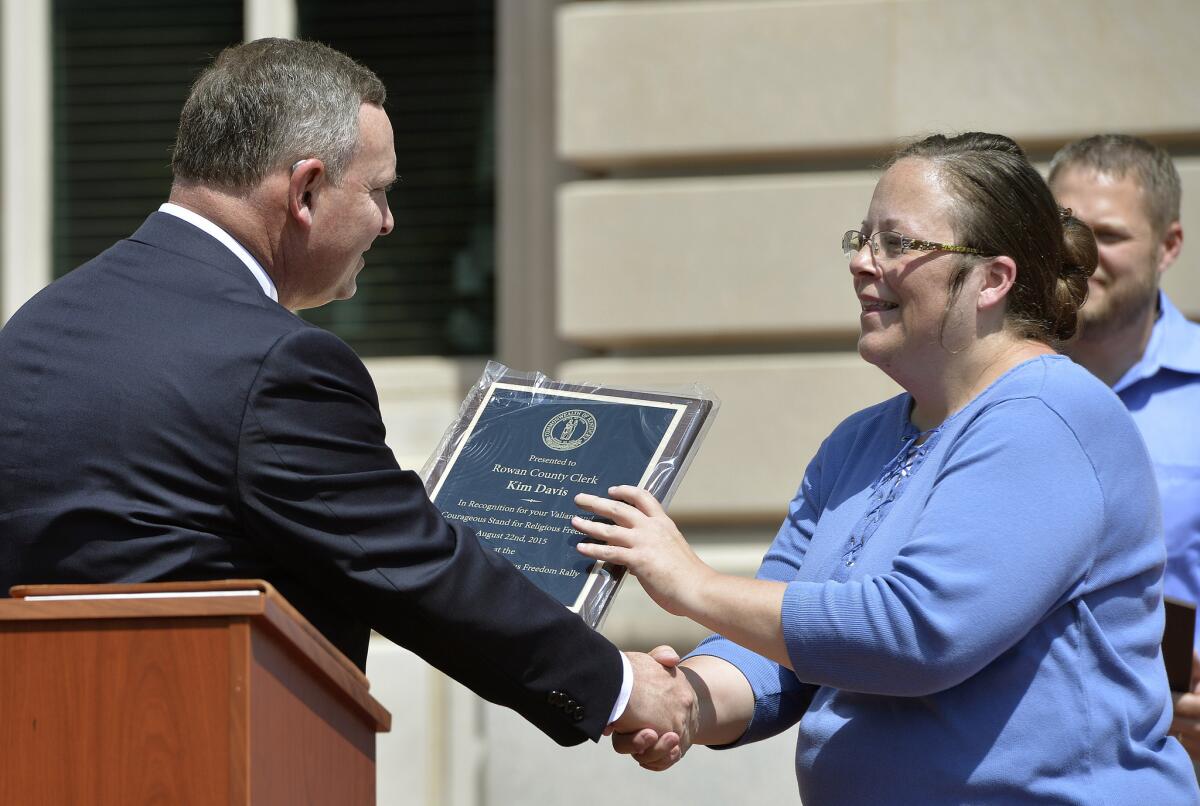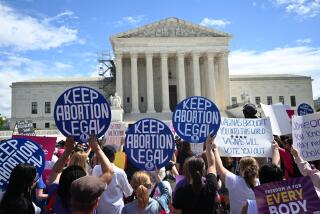Editorial: ‘God’s authority’ doesn’t apply in the Rowan County Courthouse

Pastor Jeffrey Fugate gives an award to Rowan County Clerk Kim Davis during a Religious Freedoms Rally at the Kentucky State Capitol on Aug. 22. Davis has been sued by The American Civil Liberties Union for denying marriage licenses to same-sex couples.
On Thursday, Kim Davis, an elected clerk in Rowan County, Ky., who has steadfastly refused to issue marriage licenses to same-sex couples, is expected to appear before a federal judge who could find her in contempt of court and jail or fine her. Neither sanction will be necessary if Davis does what both her beliefs and the requirements of the law demand that she do: resign or face a justified effort to remove her from office.
Historically this country has been generous toward individuals whose religious beliefs make it difficult for them to comply with the law. But the accommodation must stop at the point at which a public official refuses to discharge her legal duty by invoking “God’s authority,” as Davis has done.
Davis, a devout Christian, is a poignant figure for many Americans. But her understanding of her public responsibilities is impaired to the point of absurdity. For example, she suggests that because she swore to uphold the law “so help me God,” she is bound not only by the law and the Constitution but also by the moral law of God, natural law and her own “sincerely held religious beliefs and convictions.”
Those convictions tell her that she must not issue a marriage license “which conflicts with God’s definition of marriage” — an assertion that confuses civil marriage, in which Davis’ office plays a role, with marriage in the sight of God. The question is whether that misunderstanding qualifies as a religious belief that must be accommodated. Her lawyers have suggested several such accommodations, including deputizing clerks in other counties to issue licenses in Rowan County, modifying the marriage license form to remove the clerk’s name and distributing licenses on a statewide basis.
Yet none of these contortions is required by the 1st Amendment or Kentucky’s Religious Freedom Restoration Act — any more than they would be if a clerk had a sincere religious objection to issuing a marriage license to interracial couples.
Like its federal counterpart, Kentucky’s religious freedom law allows the government to override religious objections in furtherance of a “compelling government interest.” Insisting that all public officials enforce the law and the Constitution — as opposed to their personal understanding of God’s law — is clearly such an interest. That may be why the Supreme Court on Monday refused to extend a temporary stay of a court order requiring Davis to issue licenses to both same-sex and opposite-sex couples.
In a statement released by her lawyers, Davis said that for her, issuing a marriage license to a gay couple was a “Heaven or Hell decision.” But if an elected official believes that complying with the law and the Constitution as interpreted by the Supreme Court threatens her with eternal damnation, her choice is obvious: Give up the office.
Follow the Opinion section on Twitter @latimesopinion and Facebook
More to Read
A cure for the common opinion
Get thought-provoking perspectives with our weekly newsletter.
You may occasionally receive promotional content from the Los Angeles Times.






